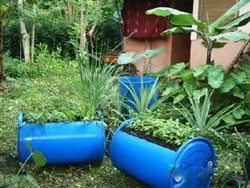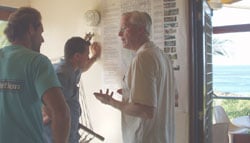Water-Smart Gardening in Costa Rica
Meeting the Challenges of a World in Need
I had two goals when I started Gardener's Supply back in 1983. First, I wanted to establish an earth-friendly gardening company that would help people have better gardens and learn to be environmental stewards of their own backyards. Second, I wanted to demonstrate the benefits that local, small-scale farming can bring to an urban community.
During our first 25 years in business, we've had tremendous success on both fronts. Gardener's Supply is now the country's leading resource for products that help people grow beautiful flowers and healthy food, make compost, improve their soil, save water and fend off pests without toxic chemicals. We also founded a non-profit organization called the Intervale Center, which is helping a dozen small-scale organic farmers produce more than a million pounds of food here in Burlington, VT. That's more than 7 percent of the fresh produce consumed annually in the Burlington area.
 These Gardener's Supply-designed self-watering planters make good use of a growing waste challenge in developing countries: 55-gallon plastic drums.
These Gardener's Supply-designed self-watering planters make good use of a growing waste challenge in developing countries: 55-gallon plastic drums.The Challenge Grows
Though we have made a significant impact in terms of environmental stewardship and community development, we are simply not moving fast enough. The assaults on our environment and communities are increasing faster than the solutions. Our natural capital (healthy soil, fresh air, clean water, forests and fisheries, biodiversity, etc.) is being consumed at an alarming pace, and global problems such as ozone depletion, climate change, population growth and water shortages now touch each of us, no matter where we live.
Lester Brown, founder of the World Watch Institute and one of the world's leading environmental and economic policy analysts, presents a compelling warning in his book, Plan B, 3.0, Mobilizing to Save Civilization. Brown notes that after over 200 years of the industrial revolution and economic globalization (guided by what he calls "Plan A") we are facing four environmental mega threats:
- Population: Over the next 20 years, world population is expected to almost double: from 6.2 billion people today, to 10 billion in 2030. World grain reserves are now the lowest they have been since World War II. China became a net importer of grains for the first time this decade. Population control is needed.
- Water: Industrial agriculture requires three times more water today than it did 50 years ago. Irrigation supports 4/5 of China's grain production, 3/5 of India's and 1/5 of the US's. Aquifers in all three of these countries are being depleted, and an invisible water deficit is growing. Grain production in China has already begun to decline as a direct result. Water-conserving farming is needed.
- Soil Depletion: Deserts are expanding and good soils are eroding or being lost to development. Less than 3% of the earth's surface is suitable for growing crops, and we cannot afford to lose even an acre of it. We need to return to sustainable farming practices that build soil fertility, and restore deforested, overgrazed hills and watersheds.
- Climate Change: When air temperatures exceed 90 degrees F, photosynthesis slows, and at 100 degrees F it stops entirely. Average global temperatures have increased 1-2 degrees F in the past 100 years and climatologists predict a 5 degree increase over the next 100 years. Climate change is real and already crop yields are falling. This may lead to the greatest species loss in 75 million years. We need to reverse global warming.
There may not be a lot that Gardener's Supply can do to control population growth or reduce global warming. But we can and will continue to make a difference, especially in the realms of water conservation and building healthy soil. And we have begun reaching out, to share these good products and technologies on a larger scale.
Thinking Locally, Acting Globally
Over the years, Gardener's Supply has introduced backyard gardeners to a range of water-saving products, including soaker hoses, drip irrigation systems, rain barrels, and self-watering planters. In 2003 we began employing our expertise with self-watering planters to design a super-productive, water-saving growing system for developing countries. This system was designed to utilize a readily available product in developing countries: 55-gallon plastic drums. After initial testing here in Vermont, these planters are currently being used in the dryland tropics of Costa Rica at El Centro Verde, an educational center for sustainable agriculture and agroforestry.
Moving from "Plan A" (environment-depleting industrialization and globalization) to "Plan B" (economic development respecting the environment and local economies) will require new ways of thinking. Developing countries, which have not yet fully experienced the economic benefits or liabilities of globalization, present an excellent opportunity for "Plan B" thinking.
I began working with Tom Peifer, the founder of El Centro Verde, 13 years ago. Using his expertise in permaculture and agroforestry, we are bringing the lessons of environmental stewardship, sustainable economic development and organic growing methods, developed here at Gardener's Supply and at the Intervale Center, to a remote section of the Pacific coast of Costa Rica (see www.elcentroverde.org).
 Tom Peifer reviews course progress for the day with Costa Rican regional planning and reforestation professors.
Tom Peifer reviews course progress for the day with Costa Rican regional planning and reforestation professors.We hope our efforts in Costa Rica can advance the vision and logic of "Plan B" for that country and eventually for other developing countries. To accomplish this goal we have begun offering university and adult education courses, education and training for local land owners, public relations and policy advocacy, and new models for commercial and residential development.
In January 2004, I offered a course in Costa Rica in association with the University of Vermont called "Ecological Design and Sustainable Development in Costa Rica". With 30 graduate and undergraduate business and environmental studies students we successfully merged the normally conflicting worlds of conventional economic development and environmental improvement, both in the classroom and in practice. The two-week course ended with a design process for a proposed 200-acre residential development called Tierra Pacifica. The owner of the land, guided by input from the course, redesigned his original development concept. Tierra Pacifica is now committed to "being one of the first significant developments in Latin America to capture and reuse rainwater, to operate an on-site conservation nursery, to develop a community organic farm and to use a landscaping and habitat restoration program to protect and improve soil quality, native flora and the health and diversity of resident fauna".
 Will Raap explains the ecological restoration purpose of the Rio Andamojo Green Map to two business students.
Will Raap explains the ecological restoration purpose of the Rio Andamojo Green Map to two business students.In 2005, 2006 and 2007 we conducted additional two-week courses, targeting university students, entrepreneurs and environmental professionals. These courses generated a multi-year ecological and economic restoration plan for the 25,000 acre Rio Nandamojo watershed. The plan will include a land-based business development strategy to support restoration of the Rio Nandamojo watershed over the next decade. My original vision for Gardener's Supply was that each of us, in our gardens, homes and communities, could play an active part in making a greener, healthier world. I feel even more strongly about this vision today. Going forward, our gardening innovations will support this vision, from new lawn fertilizers that eliminate the phosphorus pollution flowing into our rivers and lakes to new water-saving innovations that allow people to produce more food in less space and with less water. Our community efforts will support this vision, too. From helping other cities and towns launch their own versions of the Intervale Center, to honoring Garden Crusaders, and promoting community gardening. Our commitment for the next 25 years is to continue to help our customers become better gardeners and better stewards of their environment and their communities, here in America and beyond.
Will Raap is Founder and Chairman of Gardener's Supply Company. This article was originally published in 2008.
Print this Article:
Get the Dirt
Stay up to date on new articles and advice. Please fill out the information below.
